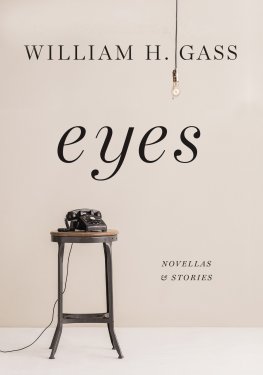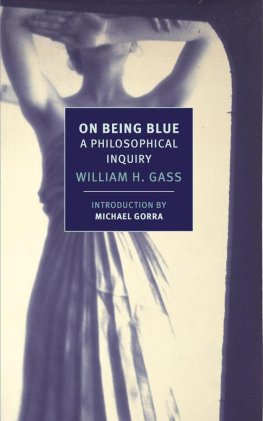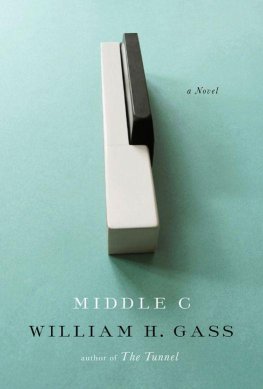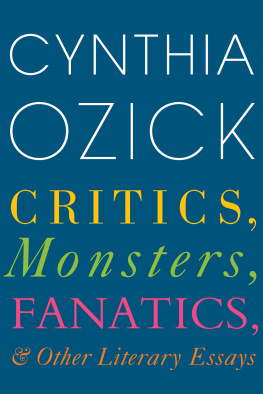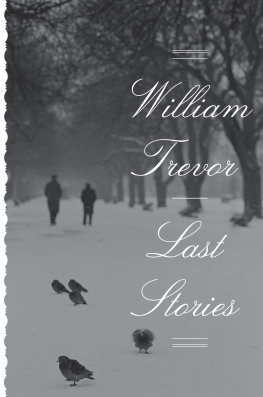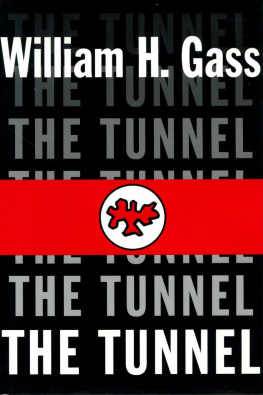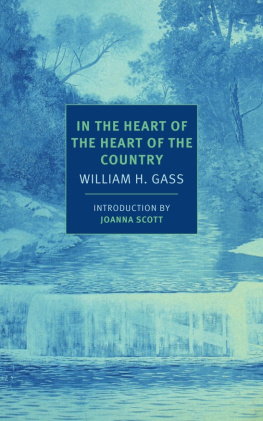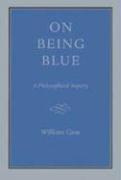William H. Gass
Eyes: Novellas and Stories

Taken from Hatred and Civility: The Antisocial Life in Victorian England, by Christopher Lane. Figure 6.1, Der Augenturm (The Eye Tower), 1977. Copyright Dieter Appelt. Courtesy Kicken Berlin and the Pace/MacGill Gallery, New York.
Eyes: Novellas and Stories
FOR MARY
thru thick and thin
THE POINT WHERE AN UNDERGROUND SPRING SUDDENLY BURSTS TO THE SURFACE IS KNOWN AS AN EYE. IT IS A PLACE OF MYSTERY, WHERE DRY GROUND BECOMES SOAKED WITH LIFE-GIVING WATER, AND NATURE GIVES US A GLIMPSE OF ALL THAT HAPPENS OUT OF THE REALM OF HUMAN VISION.
Jan DeBlieu
Four pieces in this groupIn Camera, Charity, Dont Even Try, Sam, and The Man Who Spoke with His Handsfirst appeared in that sterling magazine Conjunctions, while the oddly authored Soliloquy for a Chair was published in Tin House and Toy Chest in The Yale Review. Thanks, too, to artists Michael Eastman and Michael Hafftka, as well as for the assistance of Catherine Gass.

Photo of the author by the author
Mr. Gab didnt have that gift, though his assistant, who was supposed to be stupid but only looked so, would mutter beneath his breath, when annoyed by his tasks, he had the gift, he did, did Gab. Mr. Gab spoke seldom, and then it was to shout at the steel shutters of the shop that were always reluctant to alter their position, whatever it was, and needed to be cajoled, flattered, then threatened. Or sometimes he spoke to the steam pipes, complaining of the knocking, complaining of the excessive heat they gave off when they had to be heated and of the odor that the steam brought to the nose through layers of paint resembling aluminum. Curls the graphs, he said with as close to a curse as he came.
Mr. Gabs shop was in a part of town so drably uninteresting robbers wouldnt visit even to case its joints, something Mr. Gab fairly certainly knew, and treasured, but he had these steel shutters left over from a former, more frequented, more luxuriant time, and felt obliged to use them. One could have guessed Mr. Gabs age from these small facts: that he thought of possible intruders as robbers, and worried about being glommedterms which have no present employment. The shutters, window-wide slats of steel in Venetian style, creaked as they descended, and no longer fit firmly together or overlay one another as they had been designed to do in some far-off factory; consequently, streetlights lit to illuminate an empty avenue whose venerable storefronts were a menace even during the glare of sunny afternoons would streak into the shop at night where Mr. Gab might still be sitting, long after closing, long after nodding bye-bye to his stupid assistant, staring at his prints in the darkness, prints that covered the pockmarked walls of the shop, displayed there like dead things hung from nails, as if slain while other prey were being hunted: while picking up fallen apples maybe (though he lived so far from the country), or rather if a brace of grouse were to fling themselves into the apple bag, or while gathering pignuts (models ago hed sold his car) a pair of pigeons might creep into a handy box that unlikely while sorting buckeyes to find the feathers of a turkey, or, while pulling loganberries out of their briaries (though he wore no woolen sleeves), flushing a covey of quail instead anyway prizes inadvertently taken, mistakenly developed, proudly framed.
Mr. Gab certainly had his favorites. These were images he knew so intimately they were well, not quite etched on the balls of his eyes. He needed only the least light to see them down to their last shades of gray: an Atget was frequently imagined to be the state of his street outside Atget, the documentarian. Perhaps hed decide on the Atget of an intersection, of Angle de la rue Lhomond et de la rue Rataud, its cobbles moist, in late light, sky like sour milk, taken in the quartier du Val-de-Grce, where on one wall a poster was papered to say un million, un million, a dozen times in a voice not ever husky. Forever, Mr. Gab would allow himself sometimes to murmur: cours de danse givreforeverthough the cours is gone, danse is gone, even before the War arrived in a taxi, they were gone, gone, cobbles gone too, now, probably, building likely, gone, the lamp most certainly, gone, and the teeth of steel, like those of a large rake, that crossed the rue high above every head sure, sure that crossed the top of the image straight through the sour-milk sky and over the tree at rues end oh yes gone, quite gone, even the tree whose feet were hid behind a low wall, deep in the shot where the road disappeared into a vee as though down a drain ah well cut by now, blown over, hauled off, firewooded, gone. Dear me.
What a curb, Mr. Gab permitted himself to exclaim. At the Louvrewhat did the advert advise and proclaim? Who could say? With the wall retreating, the posters defaced. What a glisten though! Stillthe curb, the glisten, the deep recession of the street remained. Right outside there, beyond that barred door, beyond the shuttered window, lay Atgets modest little street still. Stillmade of wavering lines of glis and shales of shine. The walk protected by posts. Mr. Gab did not dare to say aloud what he succinctly thought, as he looked out through his engraved eyes: I am Atget the world is mine.
Only during the evening following work Mr. Gab thought that way of it, thought of it as work shortly after he had well dined, but before he went slowly to bed, unbuttoning the buttons down his shirt well, his vest first seeing the street or some other scene all the while the buttons went as buttons do, loose from their hole, not like released birds because it was shirt that was freed, the vest that flew loose, even if it clung to his slender frame like a woman in a romance to her equally handmade lover no the buttons like sentries would stay sewn in their useful line perhaps for an entire shirt life, vest time. In photographs, shirts do not get much attention.
He could of course have chosen to recall the elegant details of Le Restaurant Procopes faade, the cafs name like a decoration running along in front of the buildings second-floor windows, each letter as bold as an escutcheon affixed to a wrought-iron balcony railing: GRAND RESTAURANT PROCOPE, and then, under the overhang, discreet as a meeting, the name again: Grand Restaurant Procope, no doubt no longer in business though one sign said verte du vins pour villeoh the hanging lamps were like crowned heads, the walk lined with tables and paired chairs, the hour early, each empty not the hours but the chairs a busy day ahead of them, waiting to accommodate customers no longer alive.
Mr. Gab lived as many shopkeepers once did, both at the rear and above his establishment. He slept in a small loft a good size for bats that he reached by climbing the short stair that rose unsteadily from a corner of his kitchen, a kitchen of sorts, in whose foreshortened center Mr. Gab kept a card table and a ceramic cat. Breakfast might be an apple and an egg. Lunch he frequently passed on lunch, though his stupid assistant ate lunch like a lion, growling over some sandwich distantly fixed. A sip of tea, a chewy biscuit maybe. Memories going back a long way. Mostly, though, he passed on lunch.
Days were dreary oh yes especially in a shop stuffed with gray-white gray-black photographs in cellophane sheets that had been loosely sidefiled in cardboard boxes, tag attached, maybe FRENCH XX or COUNTRYSIDE BRITISH or RAILROADS USA. He had three for trees: bare, leafed, chopped. On the walls, clipped to wire hangers that were then hung from nails, were his prizes, displayed so as to discourage buyers. Successfully. So far. For a decade.

